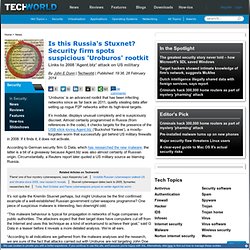

Is this Russia's Stuxnet? Security firm spots suspicious 'Uroburos' rootkit. ‘Uroburos’ is an advanced rootkit that has been infecting networks since as far back as 2011, quietly stealing data after setting up rogue P2P networks within its high-level targets.

It’s modular, displays unusual complexity and is suspiciously discreet. Almost certainly programmed in Russia (from references in the code), it checks targets for the presence of the USB stick-loving Agent.btz (‘Buckshot Yankee’), a mostly-forgotten worm that successfully got behind US military firewalls in 2008. If it finds it, it does not activate. According to German security firm G Data, which has researched the new malware, the latter is a bit of a giveaway because Agent.btz was also almost certainly of Russian origin. Circumstantially, a Reuters report later quoted a US military source as blaming Russia.
Cyber Warfare - Russia-Gerogia conflict Look Out Above! Russia May Target U.S. Sats With Laser Jet. Profile of Russian Security Services Commentator Andrey Soldatov. Nashi. Georgia Takes a Beating in the Cyberwar With Russia. Besides the bloody shooting war going on between Georgia and Russia, there’s another, quieter battle going on in cyberspace.

The Georgian government is accusing Russia of disabling Georgian Web sites, including the site for the Ministry of Foreign Affairs. Because of the disruption, the Georgian government began posting the Foreign Ministry’s press dispatches on a public blog-hosting site owned by Google (georgiamfa.blogspot.com) and on the Web site of Poland’s president, Lech Kaczynski. Separately, there were reports that Estonia, which was embroiled in an electronic battle with Russia in May of last year, was sending technical assistance to the Georgian government. The attacks were continuing on Monday against Georgian news sites, according to Jose Nazario, a security researcher at Arbor Networks, based in Lexington, Mass.
“I’m watching attacks against apsny.ge and news.ge right now,” he said. Georgia is dependent on both Russia and Turkey for connections to the global Internet. Anatomy of a cyberwar in Georgia. By Gregoy M.

Lamb / August 13, 2008. Cyber War 2.0 — Russia v. Georgia. The second real cyber was has broken out.

On August 8th, Russian troops crossed into South Ossetia vowing to defend what they called “Russian compatriots”. As this was taking place, a multi-faceted cyber attack began against the Georgian infrastructure and key government web sites. The attack modalities included: Defacing of Web Sites (Hacktivism), Web-based Psychological Operations (Psyc-Ops), a fierce propaganda campaign (PC) and of course a Distributed Denial of Service Attacks (DDoS). Shortly after noon east coast time in the United States, CNN’s Wolf Blitzer attempted to interview Georgian President Mikhail Saakashvili by phone on his live news program.
The first attempt was unsuccessful and the second attempt took place about ten minutes later was able to successfully connect to President Saakashvili. At one point(used in the sentence above), multiple government websites were down or inaccessible for hours. Estonia blames hack attacks on Russia. The cyber raiders hitting Estonia. As Estonia appeals to its Nato and EU partners for help against cyber-attacks it links to Russia, the BBC News website's Patrick Jackson investigates who may be responsible.

Estonia, one of the most internet-savvy states in the European Union, has been under sustained attack from hackers since the ethnic Russian riots sparked in late April by its removal of a Soviet war memorial from Tallinn city centre. Websites of the tiny Baltic state's government, political parties, media and business community have had to shut down temporarily after being hit by denial-of-service attacks, which swamp them with external requests. Some sites were defaced to redirect users to images of Soviet soldiers and quotations from Martin Luther King about resisting "evil". Getting hit hard "Of course [sites] can be put up again, but they can be attacked also again," Mihkel Tammet, head of IT security at the Estonian defence ministry, told BBC World Service's Newshour programme. 'Private attacks'
More Services, Less Hardware Define Current Military Buildup. In the midst of the largest military expansion since the Reagan administration, industry analysts warn that the gravy days cannot last much longer.

While that austere forecast may be hard to comprehend in the context of soaring defense budgets, it does make sense when one looks at how the Pentagon spends its money. During this buildup, in fact, the Pentagon is not buying massive quantities of new hardware, but is spending far more on so-called “services.” The Defense Department last year acquired $295 billion worth of products and services. More than half — $152 billion — was for services. This category is vaguely defined as anything that contractors do for the Defense Department — from delivering food to military bases in Iraq to refurbishing nuclear missiles. Officials argue that the surge in contractor hiring was necessary following a decade of government downsizing that contributed to the post-Cold War peace dividend. Russia accused of unleashing cyberwar to disable Estonia. A three-week wave of massive cyber-attacks on the small Baltic country of Estonia, the first known incidence of such an assault on a state, is causing alarm across the western alliance, with Nato urgently examining the offensive and its implications.

Georgia: Russia 'conducting cyber war'